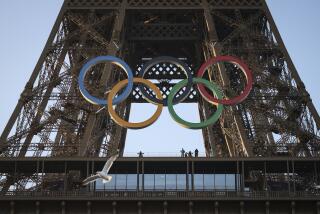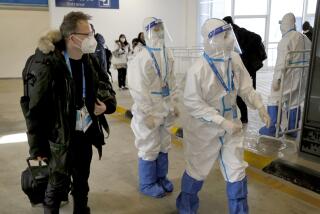Sarajevo Didn’t Go Back to Sleep : Old City Found New Enthusiasm After Winter Olympics
- Share via
SARAJEVO, Yugoslavia — Kids in ski parkas scampered across main street of the Olympic Village. Laundry flapped from overhead balconies where athletes once lounged.
Across town, skiers were lining up for the 10 a.m. bus to Mount Jahorina. Skaters crowded the rental counter at Zetra Arena for a turn on the Olympic ice.
And Mirko Milicevic, manager of the new hotel on Mount Bjelasnica, was in high spirits. His place was full, and one of the country’s top rock bands was just beginning a 15-day run in the disco.
Little more than a year ago, none of it was happening. This town of mountains and minarets, traditionally Moslem and conservative, was best known as the place where Austrian Archduke Franz Ferdinand was assassinated, triggering World War I.
That was before the 1984 Winter Olympics, , which began last Feb. 8, brought a new image to the city. Now, a generation of young managers is working to turn Sarajevo into a major recreation and tourist center.
“There are so many benefits from the Olympics,” said Vladimir Postnikov, 33-year-old chief of catering services for the new facilities. “People changed.”
Attitude is only part of the picture. The city inherited more than $60 million in sports facilities plus millions more in new housing and improvements to streets, sewers and gas and water lines, some of which dated back to the middle ages.
“Now we have a new economic structure that will bring us a new profit in tourism,” said Hajrudin Cengic, the city’s main post-Olympics coordinator.
Some things stayed the same. Olympic Village, in the Mojmilo housing area, is still called Olympic Village. People who moved into the journalists’ housing area still call their main street Mitsubishi Avenue, for one of the Games’ sponsors.
“They gave it some other name after the Olympics, but I can’t remember it,” Musaib Mesihovic, a resident, said. Officially, it’s Marka Oreskovica street.
Mesihovic, his wife and 4-year-old son moved into their new apartment after the Games following five years on waiting lists. In all, the two villages provided space for 2,744 families in this crowded city of 450,000.
The new one-bedroom flat is just 193 square feet, but it’s more than twice as large as the family’s old apartment.
“This is a lot for us,” Snezana Mesihovic said, “especially when I remember living in one room.”
Their son, Damur, goes to kindergarten nearby in the bright yellow building that used to be the recreation hall in the athletes’ village.
Officials hope outsiders will help fuel a new prosperity. Judging from advance bookings, the city can expect from 66,000 to 100,000 visitors for the Dec. 20, 1984-April 20, 1985 period, said Munir Rasidovic, president of the city tourist association.
Bookings were up 27% during March, April and May last year, compared from the year before, Rasidovic said. Other comparisons are skewed because of the influx of people for the Games, but foreign tourism was practically nonexistent before that anyway.
Rasidovic and others acknowledged Sarajevo’s main handicap--its location. Roads leading here are narrow and dangerous, especially in winter. Trains are slow.
Sarajevo is banking on the airlines, low prices and long-haul charters from America, England, France and Scandinavia.
“Sarajevo was the best deal,” said Jim Weyenberg of Appleton, Wis., who was just stepping off the plane after a side trip to Rome.
Weyenberg said his local ski club checked several resorts in the United States and overseas before deciding to book a trip here.
“The price was $800 a person, for 10 days and three meals a day,” he said. “France, Austria, Switzerland . . . were all over a thousand.”
Milicevic quoted $26 dollars as a double-accomodation price in his handsome 324-bed hotel at the foot of the Olympic ski slopes. That price includes all meals, he said.
Sarajevo is also banking on its ideas. Two years ago, for example, it was difficult for a foreigner to find his way around unless he spoke Serbo-Croatian.
The Olympics brought direction signs in English and Serbo-Croatian. Postnikov, the catering chief, said his group was setting up language schools. Waiters and waitresses who learn foreign languages can get bonuses of up to 50% of their regular salaries, he said.
Experienced help from established resorts can also make nearly twice as much as locals who are less used to working with foreigners, he said.
“We don’t find it expensive because they are extremely good and they set an example for our Sarajevo waiters,” Postnikov said.
Enes Terzic, director of the Zetra and Trebevic sports complexes, offered a visitor a ride on a new contraption--a homemade bobsled made of plastic and sponge that’s allegedly slower but safer than the Olympic variety.
The idea behind the new sled was to find a tourist use for the new Olympic bob run. Workers call it a “Vuchko,” after the Olympic wolf cub mascot.
“It only goes about 250 kilometers (155 miles) an hour,” he said. The guest declined the invitation.
“We got a lot of inspiration from the Games,” Rasidovic said. “We saw those facilities at Innsbruck (twice Olympics host) and said, ‘They are not dead. They go on living.’ ”
More to Read
Go beyond the scoreboard
Get the latest on L.A.'s teams in the daily Sports Report newsletter.
You may occasionally receive promotional content from the Los Angeles Times.






